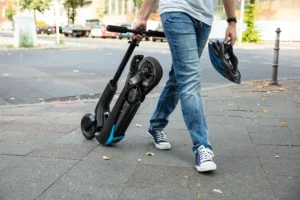As urban landscapes evolve and congestion increases, the need for efficient and sustainable commuting solutions has never been more pronounced.
Enter the electric scooter—a silent, nimble, and eco-friendly option that is rapidly reshaping the way people navigate city streets.
In this article, we’ll explore the benefits and considerations of using electric scooters for daily commuting.
Benefits of Electric Scooters for Commuting
- Efficiency and Speed: Electric scooters provide a quick and efficient mode of transportation, allowing commuters to navigate through traffic, take shortcuts, and arrive at their destinations faster than traditional modes of transit.
- Eco-Friendly Mobility: Operating on electric power, scooters produce zero emissions, contributing to a cleaner and greener urban environment. This aligns with the growing global emphasis on sustainable transportation.
- Cost-Effective: Electric scooters are generally more affordable than owning a car or even maintaining a bicycle. With lower upfront costs, reduced maintenance, and minimal charging expenses, they present a cost-effective commuting solution.
- Last-Mile Connectivity: Electric scooters excel in bridging the gap between public transportation hubs and final destinations. Commuters can easily ride from a bus or train station to their workplace, making the “last mile” of the journey seamless.
- Compact and Portable Design: Most electric scooters are designed with portability in mind. They are lightweight and foldable, making them easy to carry onto public transit or store in tight spaces at home or in the office.
Considerations for Commuters:
- Range and Battery Life: Before selecting an electric scooter, commuters should consider the scooter’s range on a single charge and the battery life. This ensures that the scooter meets the distance requirements of their daily commute.
- Terrain and Conditions: The topography and weather conditions of the commuting route should be taken into account. Electric scooters perform well on flat terrains, and weather-resistant models are preferable for those who may encounter rain or other adverse weather.
- Local Regulations: Familiarizing oneself with local regulations regarding electric scooters is essential. Some areas have specific rules about where scooters can be ridden and parked, as well as helmet requirements.
- Safety Gear: While electric scooters are generally safe, wearing appropriate safety gear, including helmets, is crucial. Commuters should prioritize their safety and invest in protective equipment for a worry-free ride.
Future Trends:
- Smart Connectivity: With advancements in technology, electric scooters are becoming increasingly connected. Features like GPS tracking, smartphone integration, and smart locks enhance the overall user experience.
- Improved Battery Technology: Ongoing research into battery technology is likely to result in electric scooters with longer ranges, faster charging times, and enhanced overall performance.
Conclusion
The electric scooter revolution is transforming daily commuting, offering a blend of convenience, sustainability, and affordability.
As cities continue to embrace eco-friendly alternatives, electric scooters are poised to become integral to the urban mobility landscape, providing a practical solution for the modern commuter.
With careful consideration of factors such as range, safety, and local regulations, commuters can make the most of this revolutionary mode of transportation, elevating their daily journeys in more ways than one.



